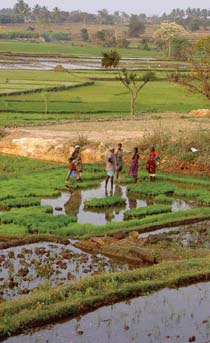Irrigation
Orissa Community Tank Management Project – A paper by World Bank on proposed project restructuring
Posted on 03 Sep, 2011 07:39 PMThis document provides an appraisal of the World Bank financed Orissa Community Tank Management Project. The project on tank rehabilitation in the state was focused on institutional strengthening, agricultural livelihood services and some irrigation improvements in the project area.
Forecasting agricultural output using space, agrometeorology and land based observations
Posted on 03 Sep, 2011 06:29 PMThis document presents the proceedings of the annual review meeting by India Meteorological Department (IMD) on “Forecasting Agricultural Output Using Space, Agrometeorology and Land Based Observations” (FASAL) organized at YASHADA, Pune during 1-2 August 2011.
Adaptive water resource management in the Lower Bhavani project command area in Tamil Nadu – A research report by IWMI
Posted on 25 Aug, 2011 11:07 PM
To what extent farmers and water resource managers already practice adaptive management and whether it is practiced in an optimal manner or could there be areas for improvement based on recent advancements in the theory of adaptive management are some of the questions that are particularly appropriate in the light of rapid changes in river basin water use and also in relation to basin closure.
This paper draws on the development and use of water resources in the Lower Bhavani Project (LBP), with the LBP reservoir and the 84,000 hectare (ha) LBP command area. The project diverts water from the Bhavani River, a tributary of the Cauvery River in Tamil Nadu.
Boundary concepts for interdisciplinary analysis of irrigation water management – A working paper by Peter Mollinga
Posted on 24 Aug, 2011 07:16 PMThe focus is concepts that capture the hybridity of irrigation systems as complex systems, and cross the boundaries of the natural and social sciences.
Urbanization and intersectoral competition for water – A report by Woodrow Wilson International Center for Scholars
Posted on 07 Aug, 2011 07:24 PMThe report by Paul P Appasamy and Ruth Meinzen Dick deals with urbanization and intersectoral competition for water founded on the view that stereotypical images of “thirsty cities” that equate urban demand with “drinking water” or factories, and rural water supply with irrigation do not adequately portray the water uses in each area.
Economic and Political Weekly 2011: Review of Agriculture (June 25 - July 8, 2011)
Posted on 28 Jul, 2011 02:25 PM
Issue: VOL 46 No. 26 and 27 Jun 25 - July 08, 2011
Review of Agriculture
Irrigation in Telangana: The Rise and Fall of Tanks
Gautam Pingle
A kalyani brought to life in Mulbagal, Karnataka: An Arghyam initiative
Posted on 27 Jul, 2011 05:58 PMGuest post by Manjunath Prasad
Public support to food security in India, Brazil and South Africa – Elements for a policy dialogue – A working paper by International Policy Centre for Inclusive Growth
Posted on 21 Jul, 2011 08:52 AM Together, India, Brazil and South Africa have about 20 per cent of the world’s population. Although the three countries have demonstrated the potential for transformative development in the South, their experience has been marked by key challenges such as relatively high levels of poverty, inequality and food insecurity, problems that persist for significant numbers of people.
Together, India, Brazil and South Africa have about 20 per cent of the world’s population. Although the three countries have demonstrated the potential for transformative development in the South, their experience has been marked by key challenges such as relatively high levels of poverty, inequality and food insecurity, problems that persist for significant numbers of people.
There is a potential to build a network of academics and experts from Brazil, India and South Africa, and food security is among the themes of great interest. This paper seeks to contribute to this process by examining pertinent elements of policy dialogue. As regards food security, each of these countries has developed conceptions and orientations that guide their policy agendas. They include distinctive treatments of several multi-dimensional strategies, multi-stakeholder arrangements and rights-based approaches.
Prospects and policy challenges in the Twelfth Plan: A special article by Montek Singh Ahluwalia in EPW
Posted on 14 Jul, 2011 08:55 AMThe year 2011-12 is the last year of the Eleventh Plan and this is therefore an appropriate time to review what has been achieved with a view to identify weaknesses in the strategy that need to be corrected, and also identify new challenges that may require new initiatives. The paper is presented in the hope of spurring a broader discussion on these issues.





